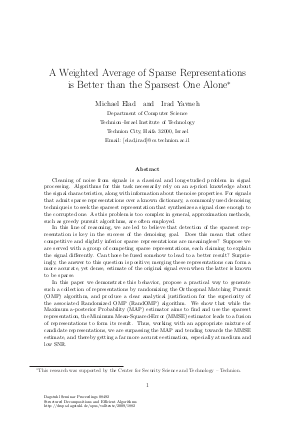A Weighted Average of Sparse Representations is Better than the Sparsest One Alone
Authors Michael Elad, Irad Yavneh
-
Part of:
Volume:
Dagstuhl Seminar Proceedings, Volume 8492
Part of: Series: Dagstuhl Seminar Proceedings (DagSemProc) - License:
 Creative Commons Attribution 4.0 International license
Creative Commons Attribution 4.0 International license
- Publication Date: 2009-02-24
File

PDF
DagSemProc.08492.3.pdf
- Filesize: 453 kB
- 35 pages
Document Identifiers
Subject Classification
Keywords
- Sparse representations
- MMSE
- MAP
- mathcing pursuit
Metrics
- Access Statistics
-
Total Accesses (updated on a weekly basis)
0PDF Downloads0Metadata Views
Abstract
Cleaning of noise from signals is a classical and long-studied problem in signal processing. Algorithms for this task necessarily rely on an a-priori knowledge about the signal characteristics, along with information about the noise properties. For signals that admit sparse representations over a known dictionary, a commonly used denoising technique is to seek the sparsest representation that synthesizes a signal close enough to the corrupted one. As this problem is too complex in general, approximation methods, such as greedy pursuit algorithms, are often employed. In this line of reasoning, we are led to believe that detection of the sparsest representation is key in the success of the denoising goal. Does this mean that other competitive and slightly inferior sparse representations are meaningless? Suppose we are served with a group of competing sparse representations, each claiming to explain the signal differently. Can those be fused somehow to lead to a better result? Surprisingly, the answer to this question is positive; merging these representations can form a more accurate, yet dense, estimate of the original signal even when the latter is known to be sparse. In this paper we demonstrate this behavior, propose a practical way to generate such a collection of representations by randomizing the Orthogonal Matching Pursuit (OMP) algorithm, and produce a clear analytical justification for the superiority of the associated Randomized OMP (RandOMP) algorithm. We show that while the Maximum a-posterior Probability (MAP) estimator aims to find and use the sparsest representation, the Minimum Mean-Squared-Error (MMSE) estimator leads to a fusion of representations to form its result. Thus, working with an appropriate mixture of candidate representations, we are surpassing the MAP and tending towards the MMSE estimate, and thereby getting a far more accurate estimation, especially at medium and low SNR.
Cite As Get BibTex
Michael Elad and Irad Yavneh. A Weighted Average of Sparse Representations is Better than the Sparsest One Alone. In Structured Decompositions and Efficient Algorithms. Dagstuhl Seminar Proceedings, Volume 8492, pp. 1-35, Schloss Dagstuhl – Leibniz-Zentrum für Informatik (2009)
https://doi.org/10.4230/DagSemProc.08492.3
BibTex
@InProceedings{elad_et_al:DagSemProc.08492.3,
author = {Elad, Michael and Yavneh, Irad},
title = {{A Weighted Average of Sparse Representations is Better than the Sparsest One Alone}},
booktitle = {Structured Decompositions and Efficient Algorithms},
pages = {1--35},
series = {Dagstuhl Seminar Proceedings (DagSemProc)},
ISSN = {1862-4405},
year = {2009},
volume = {8492},
editor = {Stephan Dahlke and Ingrid Daubechies and Michal Elad and Gitta Kutyniok and Gerd Teschke},
publisher = {Schloss Dagstuhl -- Leibniz-Zentrum f{\"u}r Informatik},
address = {Dagstuhl, Germany},
URL = {https://drops.dagstuhl.de/entities/document/10.4230/DagSemProc.08492.3},
URN = {urn:nbn:de:0030-drops-18828},
doi = {10.4230/DagSemProc.08492.3},
annote = {Keywords: Sparse representations, MMSE, MAP, mathcing pursuit}
}
